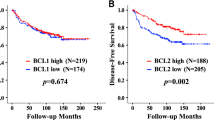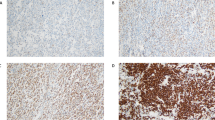Abstract
Bcl-2 has been demonstrated to inhibit apoptosis in breast cancer cells in vitro, and the ratio between Bcl-2 and its proapoptotic homologue Bax seems to be an important determinant of cellular sensitivity to induction of apoptosis. However, little information is available on the relationship between Bcl-2 and the rate of apoptotic and necrotic cell death in breast tumours. From a series of 441 premenopausal, lymphnode-negative breast cancer patients, a subset of 49 tumours was selected in which immunostaining for the 26-kDa isoform of Bcl-2 was either absent (n = 23) or very high (n = 26). High expression of Bcl-2 was found to be strongly associated with low rates of apoptotic (P < 0.001) and necrotic cell death (P < 0.001). The mean value of the apoptotic index was 2.69%+/-1.40% in Bcl-2-negative tumours and 0.68%+/-1.00% in Bcl-2-positive tumours. Expression of the proapoptotic protein Bax correlated neither with Bcl-2 nor with the frequency of apoptotic cells. Immunostaining for the antiapoptotic Bcl-2 homologue BcI-X(L) correlated with Bcl-2 expression (P < 0.001) but not with apoptosis. High proliferation rate and high tumour grade (Bloom-Richardson) were strongly associated with absence of Bcl-2 expression (P< 0.001). p53 accumulation was associated with absence of Bcl-2 expression and increased apoptotic activity. Loss of Bcl-2 expression was strongly correlated with increased apoptotic and necrotic cell death, high proliferation rate and high tumour grade, supporting a model in which Bcl-2 not only mediates cell death, but also cell division in breast cancer tissue, and in which regulation of cell division and cell death are tightly linked.
This is a preview of subscription content, access via your institution
Access options
Subscribe to this journal
Receive 24 print issues and online access
$259.00 per year
only $10.79 per issue
Buy this article
- Purchase on Springer Link
- Instant access to full article PDF
Prices may be subject to local taxes which are calculated during checkout
Similar content being viewed by others
Author information
Authors and Affiliations
Rights and permissions
About this article
Cite this article
van Slooten, HJ., van de Vijver, M., van de Velde, C. et al. Loss of Bcl-2 in invasive breast cancer is associated with high rates of cell death, but also with increased proliferative activity. Br J Cancer 77, 789–796 (1998). https://doi.org/10.1038/bjc.1998.128
Issue Date:
DOI: https://doi.org/10.1038/bjc.1998.128
This article is cited by
-
Prognostic relevance of induced and spontaneous apoptosis of disseminated tumor cells in primary breast cancer patients
BMC Cancer (2014)
-
Prognostic significance of Bcl-2 expression in non-basal triple-negative breast cancer patients treated with anthracycline-based chemotherapy
Tumor Biology (2014)
-
Apoptotic activity in Libyan breast cancer
World Journal of Surgical Oncology (2012)
-
Apoptosis, angiogenesis, inflammation, and oxidative stress: basic interactions in patients with early and metastatic breast cancer
Journal of Cancer Research and Clinical Oncology (2012)
-
Proliferation is the strongest prognosticator in node-negative breast cancer: significance, error sources, alternatives and comparison with molecular prognostic markers
Breast Cancer Research and Treatment (2009)



